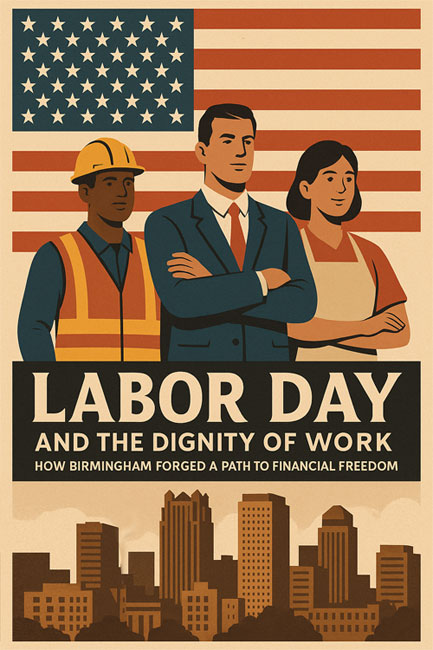Submitted by Bradford W. Botes, Sr. - Thursday, September 4, 2025

As I enjoyed this past Labor Day, my thoughts turned to Birmingham’s unique history with bankruptcy—a history deeply rooted in the value of work. For generations, our city has been at the heart of a system that gives hardworking people a chance to pay back their debts while keeping their assets and their dignity.
This connection is especially meaningful to me. Back in 1989, we opened the first Bond & Botes office right here in Birmingham. From the very beginning, it has been a privilege to represent the working men and women across Alabama and Mississippi who simply need a fair plan and a little breathing room to get back on their feet.
The Beginnings of Debtor’s Court in Birmingham
The story goes back to the 1930s, when the Great Depression left many Birmingham families buried in debt. Creditors were quick to repossess cars, seize homes, and garnish wages. For workers who depended on their paychecks to survive, the situation was bleak and offered little hope.
In 1933, in a truly groundbreaking move, Judge W.I. Grubb and Special Referee Valentine J. Nesbit used a little-known provision of the Bankruptcy Act of 1898 to create what became known as “debtor’s court.” Instead of forcing people into a straight liquidation—losing everything and ending up in poverty—they allowed workers to repay debts out of their wages under a court-approved plan.
It was a revolutionary idea that gave people a path to financial recovery with their dignity intact. Families could keep the basics they needed to live and work while showing good faith by paying back what they could. This local innovation in Birmingham eventually shaped national law. In 1938, Congress passed the Chandler Act, which created Chapter XIII—the forerunner of today’s Chapter 13 bankruptcy.
Labor Day and Chapter 13
Labor Day is a holiday built on the dignity of work. Chapter 13 bankruptcy reflects that same value. It recognizes that most debtors want to pay what they can but need time and protection from creditors to do so.
Through Chapter 13, workers make structured payments over three to five years, all supervised by the court. They often keep their homes, their cars, and their paychecks while creditors are treated fairly. It’s not about avoiding responsibility—it’s about working your way out of debt.
Birmingham’s Legacy Lives On
Birmingham’s debtor’s court didn’t just make history; it continues to shape lives today. Alabama still has one of the highest percentages of Chapter 13 filings in the country. Families here know the value of keeping their assets and paying back what they can, and Chapter 13 allows them to do just that.
For us at Bond & Botes, that legacy is personal. Since 1989, we’ve had the honor of standing with thousands of working people who want a chance to hold on to their property, protect their families, and regain control of their finances. Every case we handle is a reminder of the same principle that guided Judge Grubb and Referee Nesbit nearly a century ago: labor deserves a path forward.
If you or someone you know is struggling under the weight of debt, there is hope. Just as Birmingham once led the way with debtor’s court, we continue that mission today—helping people across Alabama and Mississippi work their way back to stability and peace of mind.
To learn more about how we can help, please reach out to us today.
Phone: 877-581-3396
Email: Click Here to email us through our website
Website: https://www.bondnbotes.com/
This post is intended for general information only and does not constitute legal advice. To discuss your specific situation, we encourage you to schedule a confidential consultation with an attorney.

 1-877-581-3396
1-877-581-3396

